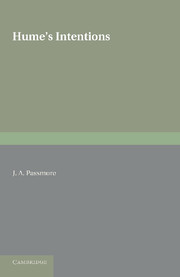Book contents
Preface
Published online by Cambridge University Press: 05 June 2016
Summary
Books ought not to be multiplied except of necessity; commentaries on Hume have nourished so exceedingly, and even excessively, that the present work might seem to flout that admirable general principle. In extenuation, I should explain that this is not a commentary, that it in no way supersedes Laird's Hume's Philosophy of Human Nature or Kemp Smith's Philosophy of David Hume but seeks rather to complement them. I have not tried to write a page-by-page account of Hume's philosophy; my object has been to disentangle certain main themes in that philosophy and to show how they are related to Hume's main philosophic purpose, in the expectation that an account of the way in which he develops these themes will be philosophically as well as historically enlightening. Criticism and scholarship are intermingled, out of a conviction that criticism without scholarship is cavilling, and scholarship without criticism is pedantry. The book has, I hope, a unity. At the same time, since some readers will no doubt be interested in one of these themes rather than another, I have tried to make each chapter a relatively independent discussion, even at the cost of occasional repetition.
My interest in Hume was first aroused by the lectures of Professor John Anderson, Professor of Philosophy in the University of Sydney, and his pupils will recognize that I am much indebted to him, especially perhaps in the second chapter but in one way and another throughout the whole book. But my method of interpretation is not his; it was first suggested to me by Professor N. Kemp Smith's articles on ‘The Naturalism of Hume’ {Mind, Nos. 54–5); for some time my work ran parallel with his, as I discovered from his Philosophy of David Hume; I owe a great deal to that book, to his edition of Hume's Dialogues on Natural Religion, and to his personal encouragement. Of my other predecessors, John Laird and T. H. Green are the ones to whom I feel myself most indebted, but I have borrowed copiously from innumerable sources.
- Type
- Chapter
- Information
- Hume's Intentions , pp. vii - viiiPublisher: Cambridge University PressPrint publication year: 2013



